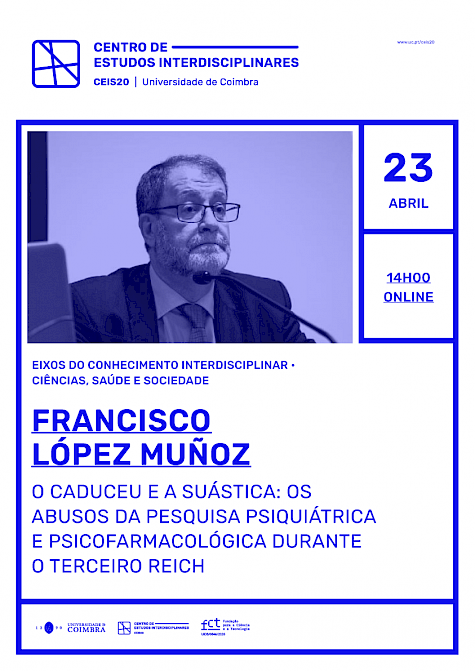An exclusive online conference with Dr Francisco López Muñoz will take place on 23 April, on O caduceu e a suástica: Os abusos da pesquisa psiquiátrica e psicofarmacológica durante o Terceiro Reich. (The Caduceus and the Swastika: The misuse of psychiatric and psychopharmacological research during the Third Reich)
During the Nuremberg Trials, 23 Nazi doctors were tried as war criminals in what became known as the 'Doctors' Trial'. This trial exposed a perverse system of criminal use of medicine in public health and human research. These practices, in which racial hygiene was one of the fundamental principles and euthanasia programmes the most obvious consequence, violated most known bioethical principles.
Psychiatry played a central role in these programmes, and the mentally ill were the main victims of these programmes. From a historical perspective, we analyse the background to the shameful euthanasia programmes for the mentally ill, the procedures involved in their implementation and the use of the mentally ill as research material. The Nuremberg Code, a direct result of the Doctors' Trial, is considered to be the first international code of ethics for human research and was an attempt to prevent a repetition of the tragedy that occurred under the Nazis. The 1996 Madrid Declaration was the most recent attempt to eradicate these appalling practices from an ethical perspective. Various strategies can be used to combat such abuses, although it is uncertain how effective they are in preventing them.

FRANCISCO LÓPEZ MUÑOZ (MD, PhD, DLitt, DHC) - Professor of Pharmacology and Vice Rector for Research and Science at the UCJC
In addition to his academic interests, Francisco López-Muñoz is the Director of the International Editorial Board of the collection "Medical Humanities: Culture, Art, Science, and Health", published by Delta Publications in Madrid. He is a member of prestigious academies such as the Royal Academy of Medicine and Surgery of Cadiz, the Royal Academy of Medicine of Eastern Andalusia and others. Francisco López-Muñoz's extensive academic involvement includes participation as a visiting professor or director in more than 170 postgraduate and doctoral courses worldwide. He has supervised numerous doctoral theses, participated in several research projects and carried out evaluations for European agencies. As an editor/author, he has contributed to 31 books, written 241 chapters and published 516 articles on psychopharmacology and related topics. He is a member of several scientific societies and editorial boards and is a member of the Academy of Military Sciences and Arts, the Royal Academy of the Sea and the Academy of Diplomacy of the Kingdom of Spain. His international recognition includes being named academic of the National Academies of Medicine in several countries, which is a testimony to his significant contributions to academia, research and scientific and medical societies around the world.
Prof López-Muñoz has received several awards for his research career, which spans neuropsychopharmacology and neuroscience, focusing on diverse aspects such as the neurobiological basis of substance abuse, dual diagnosis, mental disorders, psychotropic drug interactions, the neurobiology of aggression, bibliometric techniques in neuropsychiatric disciplines, combination therapies for resistant depression and refractory schizophrenia, and the history of psychopharmacology and neuroscience. These include investigations into psychopharmacological abuse during the Third Reich, historical interpretations of the anatomical locations of the human soul, and the use of psychotropic drugs in literary texts from the Golden Age, such as those of Cervantes.

